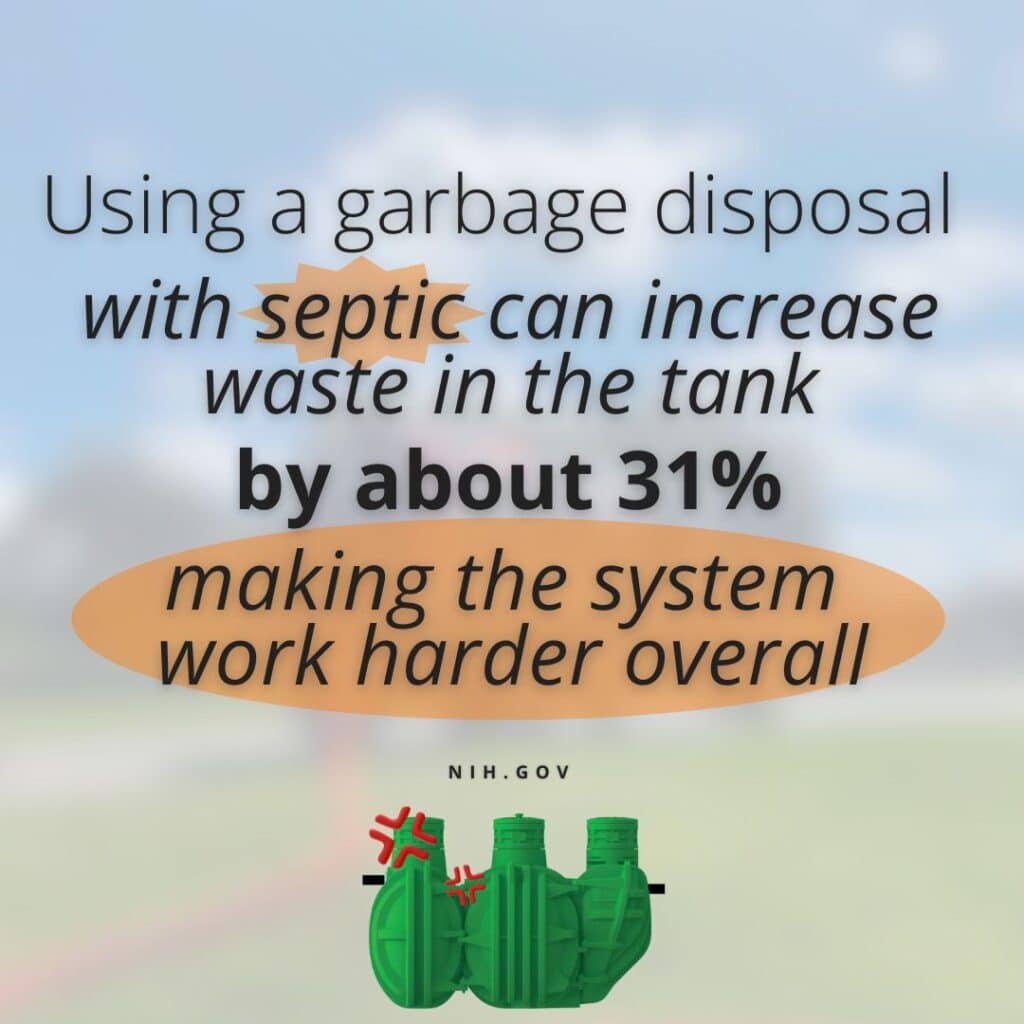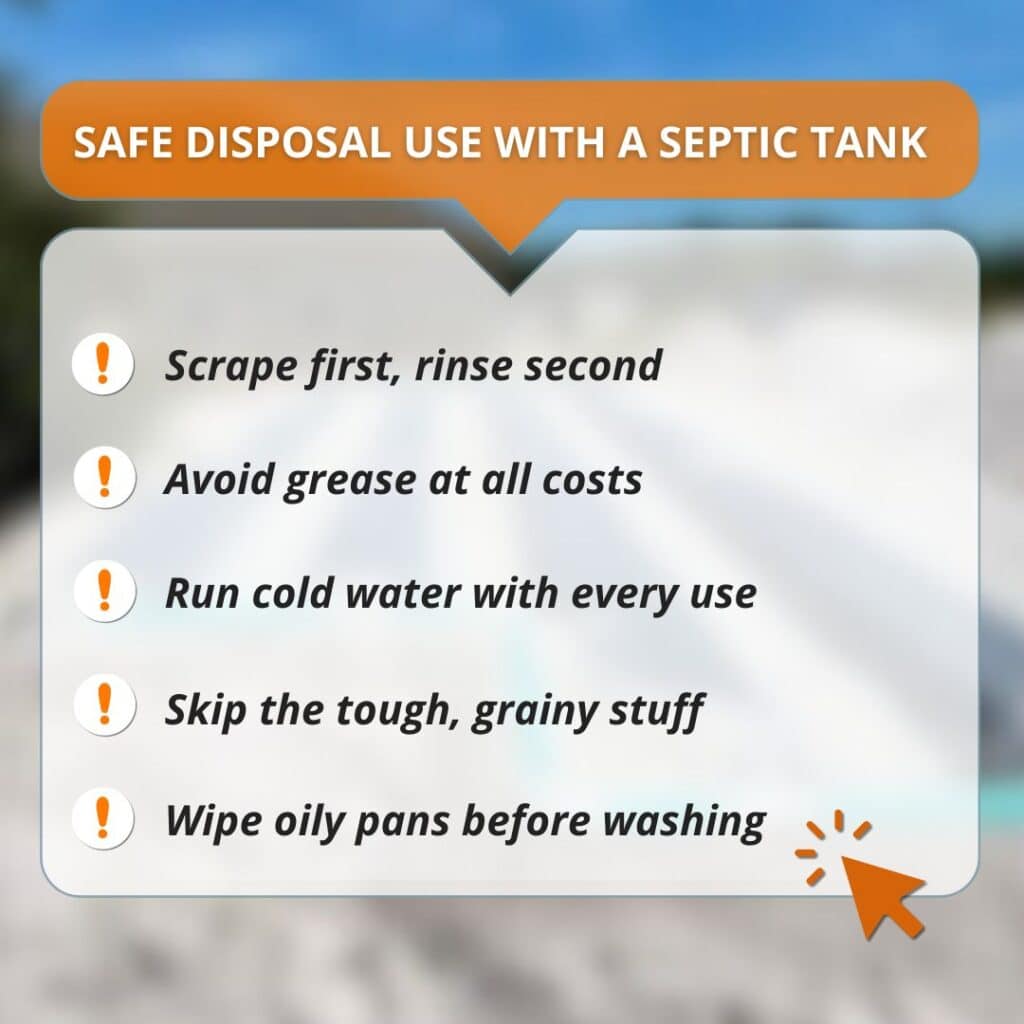If your home uses septic, you already know it needs a little extra care. One question we hear a lot is simple to ask and tricky to answer. Can you safely use a garbage disposal with a septic system? The short answer is yes, with limits. The long answer is that a disposal adds solids and grease to your tank, which can strain the system unless you change a few kitchen habits and keep up with maintenance.
Our goal in this guide is to make the situation clear and help you protect your septic system for the long run.
How Your Septic System Works
Every drain in your home sends wastewater to the septic tank. Inside the tank, heavy solids sink to the bottom and form sludge. Oils and grease float to the top and form scum. The cleaner liquid in the middle flows out to the drainfield, where the soil finishes the treatment.
This balance works best when we keep extra solids and grease out of the tank and when we pump on time. The EPA recommends inspections every one to three years and pumping every three to five years, depending on household size, tank size, water use, and how many solids enter the system.

Why Garbage Disposals Can Be Hard on Septic Systems
1) More solids enter the tank
A garbage disposal grinds food, but does not make it disappear before it reaches the septic system. Those particles still reach the tank and add to the sludge layer. The more solids that enter, the faster the tank fills and the sooner you need pumping.
Both the EPA and Florida health agencies advise homeowners to limit or eliminate disposals with septic systems for exactly this reason.
2) Food breaks down slowly
Human waste and septic-safe tissue break down faster than many foods. Meats, starchy leftovers, and fibrous vegetables can linger in the tank. One lab study found that using a garbage disposal increased solid waste in the tank by about 31% and made the system work harder overall.
3) More grease risk
Any fat or oil that reaches the tank floats to the top and can move to the drainfield if it escapes the tank outlet. Never put cooking oil or grease down a sink, and keep disposal use to a minimum to reduce fats and other solids that can clog the drainfield.
If You Use a Disposal, Use It This Way
We are not here to take away a tool you like. If you decide to keep your disposal, use these habits to lower the risk:
- Scrape plates into the trash or compost first. Rinse only small bits.
- Skip bones, coffee grounds, celery, onion skins, corn husks, artichokes, and fruit pits.
- Never send oil, butter, pan drippings, or gravy down the drain.
- Run cold water while grinding and for 10 to 15 seconds after to move particles through.
- Treat the disposal as a backup, not a primary bin. Use it less often and for smaller amounts.
Some Everyday Alternatives
If you want the safest path for your septic system, consider these simple swaps:
- Compost bin for fruit and veggie scraps.
- Sink strainer to catch particles before they reach the pipes.
- Countertop scrap can with a lid for easy trips to the trash or compost.
- Wipe pans with a paper towel before washing to keep grease out of drains.
UF IFAS Extension notes that limiting disposal use and composting kitchen scraps support better septic performance and reduce how often you will need pumping.

How Disposal Use Impacts Pumping Schedule
Because a disposal increases solids, most homes that use one need more frequent service. A typical schedule without a disposal is pumping about every three to five years. With regular disposal use, many homes see a one to two-year interval instead, depending on tank size and household size.
That’s because more solids build up faster and need to be removed to protect the drainfield.
A 2019 study also helps explain why intervals shorten. More food waste in the tank raises solids and organic load, which increases the chance of clogs and pushes the tank to capacity faster.
Signs Your Disposal Habits Are Stressing the System
|
The Sign |
What It Can Mean |
|
Drains run slowly or gurgle |
Buildup in pipes or a heavy sludge layer |
|
Odors from sinks or in the yard |
Waste is not breaking down or is reaching the field |
|
More frequent clogs |
Too many solids in the tank or lateral lines |
|
Soggy grass or standing water near the field |
Drainfield overload or failure risk |
If you see any of these, schedule an inspection and a pump if due. The sooner we correct the load or remove excess solids, the better your chance to protect the field.
A Simple Kitchen Routine That Protects Your Tank
Use this fast checklist each time you cook or clean up:
- Scrape food into the trash or compost.
- Wipe greasy pans with a paper towel and put the towel in the trash.
- Rinse the sink strainer into the trash, not the drain.
- If you must use the disposal, run cold water and grind just the small bits that remain.
- Keep a covered scrap can on the counter so the trash trip is quick and clean.
Other Related Questions Homeowners Ask
Is a “septic-friendly” garbage disposal a good solution?
Not really. Some newer disposals say they’re septic-safe or include enzyme packs, but they still send solids and grease to the tank. If you’re thinking about one, call us first, and we’ll explain what works best based on your tank and household habits.
Does the type of food matter when using a disposal?
Yes. Grease, meat, pasta, and fibrous scraps (like corn husks or onion skins) are harder on your system than soft, small bits. We can walk you through a safe use plan and inspect your tank if you’re unsure what it’s handling.
Can I stick to a normal pumping schedule if I use the disposal only once in a while?
Maybe. Disposal use, even part-time, adds solids faster than most people think. If it’s been a few years since your last service, we can check your levels and confirm the right interval for your home.
Who manages septic system rules in Florida?
State rules come from the Florida Department of Health. We handle all the septic inspections, pumping, and maintenance you need at the local level. If you’re unsure who to contact, just reach out!
When to Call a Professional
If you’ve been using a garbage disposal and aren’t sure how it’s affecting your septic system, call us. We’ll inspect the tank, check sludge and scum levels, look for signs of drainfield stress, and pump if needed.
You should also reach out if:
-
You notice slow drains, foul odors, or soggy grass
-
You’ve had a sudden spike in disposal use
-
You don’t remember the last time your tank was pumped
-
You want help setting a custom maintenance schedule that accounts for disposal use
Tampa Bay Septic doesn’t just pump and leave. We help you understand what’s going on in your system, how to protect it, and how your habits in the kitchen can affect your tank’s long-term health.
Conclusion
A garbage disposal and a septic system can live in the same kitchen, but only when we keep solids and grease to a minimum and keep maintenance on schedule. If you want the safest route, use a strainer, compost what you can, and save the disposal for the small bits that slip through. If you keep the disposal, plan on more frequent service. Either way, we are here to help.
Have questions about your pumping schedule or a slow drain you keep noticing? Contact Tampa Bay Septic for an inspection and a clear plan that protects your tank and drainfield.
